Burned out, walking out
Striking teachers say workload and poor pay has taken heavy toll
Friday, 3rd February 2023 — By Izzy Rowley and Charlotte Chambers
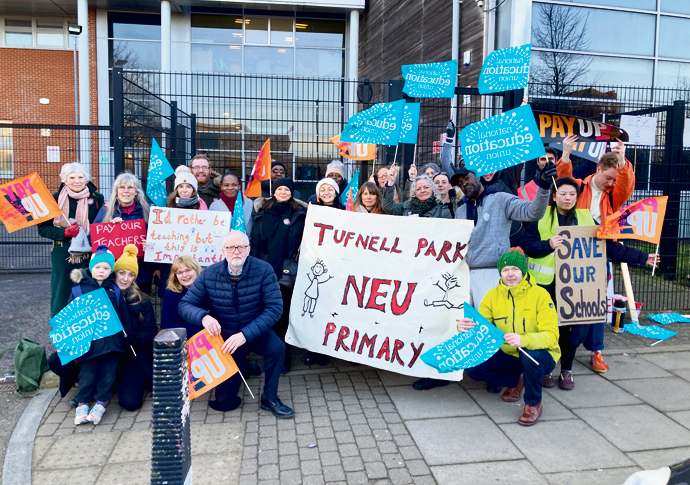
Islington North MP Jeremy Corbyn shows his support for Tufnell Park Primary School teachers taking strike action this week
TEACHERS warned of workload burnout as they walked out on strike this week demanding a fair pay package.
On picket lines and at rallies, staff provided a chaotic of picture of what is going on behind school gates, telling how many are now leaving the profession.
Central London was brought to a halt on Wednesday afternoon as tens of thousands of teachers marched on Westminster, following in the footsteps of a range of key workers, demanding an improved financial deal amid the cost of living crisis and racing inflation.
Their industrial action came at the same time as railway workers brought the train network to another standstill in their lengthy dispute over pay and conditions. Before the march, teaching staff from Islington’s schools held a rally near Angel tube station where they were frank about the pressures they are facing.
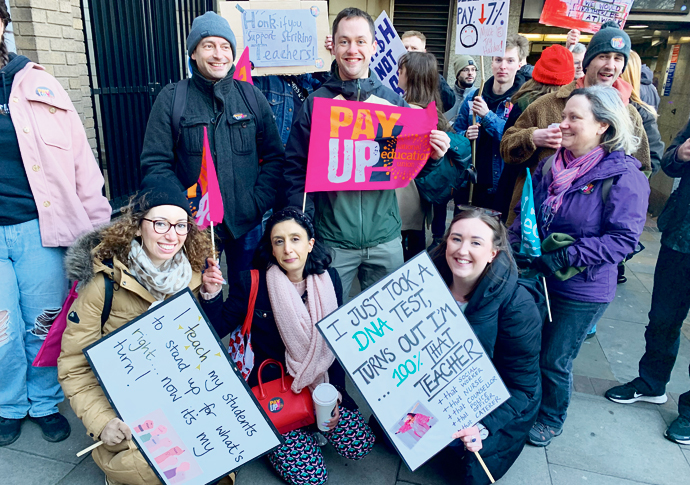
Secondary school teacher Tina Jagpal (kneeling, centre) during the march on Wednesday
“I’ve been a teacher for less than five years, and the number of times I’ve seriously thought about packing it in – I mean, many times a year I think about it, but I’m trying to stick it out. It’s hard,” said Dan, 45, a primary school teacher who did not want his surname used.
“The kids make it worthwhile, but it comes at a huge cost for my mental health. I’ve signed off once due to mental health problems, and I never had anxiety before. I’ve felt very close to burnout, and it just doesn’t seem like it’s a problem that’s going away,” he said.
Teachers at the rally reported that retaining more experienced teachers is a critical problem.
“In my school, we have Year 11s being taught by supply teachers,” said Tina Jagpal, who teaches maths at a secondary school, and has been in the profession for 17 years, which she describes as being “rare” now.
“This is about recruitment as much as anything else. [New staff] need mentors – and who’s going to mentor them if we can’t retain teachers?” she said.
Ross, who started his career as a secondary school English teacher during the pandemic in Islington, is facing the grim realities of the cost of living crisis in combination with low pay.
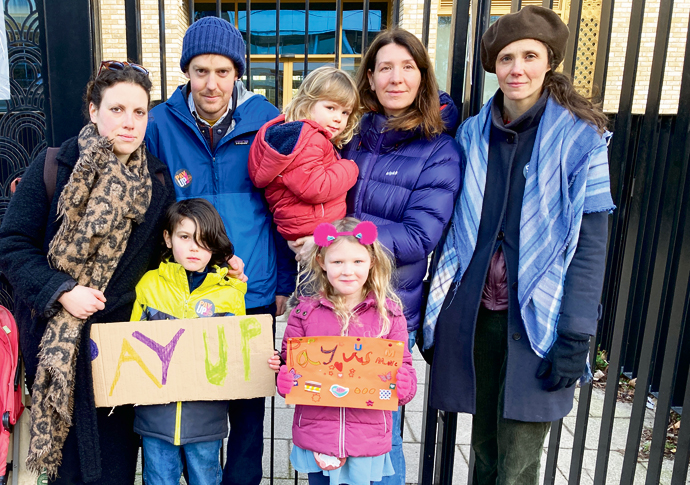
Parents and children on the picket line at Tufnell Park Primary School tell the government to ‘pay up’
“My rent has gone up by £100 this year,” he said. “I fell in love with the job […] but the main reason I’m striking is basically to try and increase my ability to afford to live in London,” he said.
“My sister’s a doctor, my other sister is a physio, and my mum is a speech therapist. All of our careers have been affected by chronic underfunding and have just become reliant on the care, support and passion that people have for supporting their communities – but that has been eroded. You can only rely on people’s goodwill for so long. And it just feels like crunch time now.”
Ms Jagpal voiced concerns about the impact of low pay on her colleagues: “I know teachers who are counting every penny and living pay cheque to paycheck. It’s just gone beyond now.”
Jeremy Corbyn, Islington North MP, echoed the sentiments of teachers at the rally.
“This is a fight for decent conditions. Teachers are underpaid, overstressed, and students are often over tested and also very stressed as a result.
“It’s not right that so many young teachers go into the profession because they want to teach, because they love the idea of teaching, because they love the inspiration that young people and children bring to us, and they get burnt out,” he said.
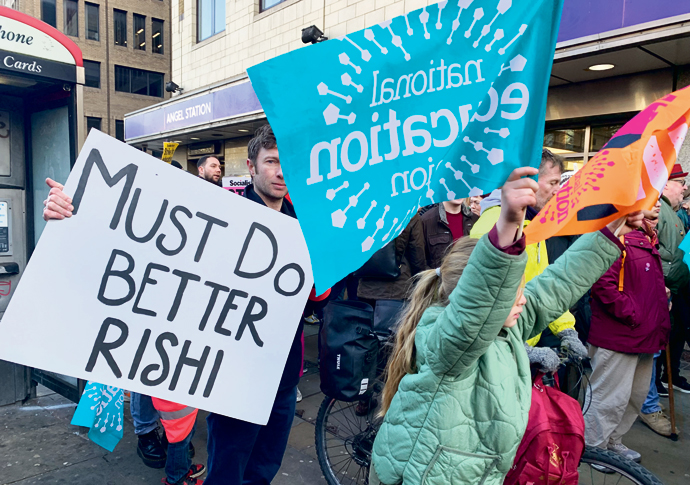
Striking teachers make their way past Angel Tube station on their way to Westminster
“The government then claim that pay increases bring about inflation. I don’t know which figures they’re reading, but working-class income and living standard has fallen consistently over the past 12 years.
“It’s not pay rises that have brought about inflation. It is dividends, its profit, its non-doms, it’s squirrelling what should be paid away in tax havens. It is excessive profiteering that has brought about inflation.”
Cllr Janet Burgess, who was at the picket line in Tufnell Park Primary School, said: “Teachers’ pay has slipped behind for the last 12 to 13 years and I think it’s unreasonable. I think it is immoral to expect teachers to, or anybody for that matter, to see their income reduce.
“It’s demotivating, taking advantage of people who love their jobs and thinking you can pay them less just because they like their jobs. It isn’t right.”
Cllr Tricia Clarke, a governor at the school for five years, said: “They’re cutting teachers’ pay, they haven’t had a pay rise for a long time. And our children deserve a decent education and there’s just this shortage of resource now in schools.
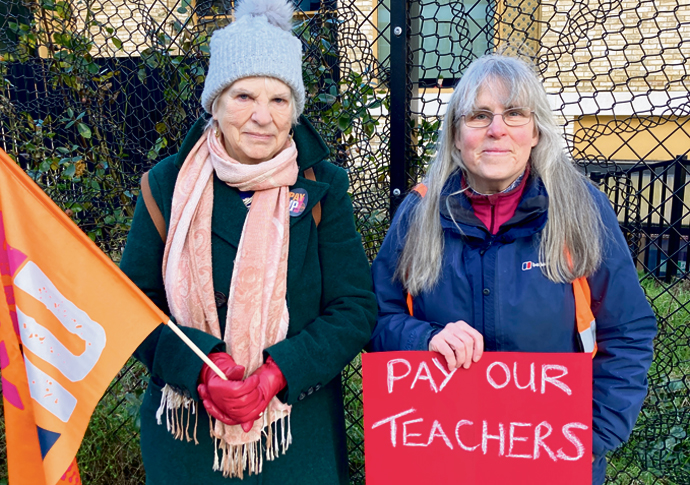
Cllr Janet Burgess and Cllr Tricia Clarke, a governor at Tufnell Park
“They need decent resources. They need a really good education. I think this government doesn’t really understand because they’re so privileged to vote. A lot of them have been to Eton, a lot have been to the top universities. I don’t think they really understand the situation. You know, they’ve had this privileged education. We want the same opportunities for our children.”
Mick Lynch, the head of the RMT, who attended the march as it passed from King’s Cross Station on the way to Westminster, offered his solidarity and support.
“This is a turning point in our country today, because we’ve got so many workers showing their determination and coming out on strike and showing this government that they have got to change their ways,” he said. “They’ve got to change the way they fund public services, and they’ve got to pay our public servants, including our teachers, health workers, rail workers, fire workers, everyone else. We need a pay rise and we deserve a pay rise.
“Through your actions, I’m sure you’re going to get the pay rise that you deserve. Keep going, keep strong, and let’s win this together.”
In television interviews on Wednesday, education secretary Gillian Keegan said the government could not “bake inflation” into teachers’ pay.
“I’m not going to go in and say ‘we will do inflation plus whatever’ – it would be economically incoherent to do that, we can’t do that, we’ve made that very clear,” she said. “But we will get inflation down so everybody will feel better.”
‘Lots have left because London is so expensive’
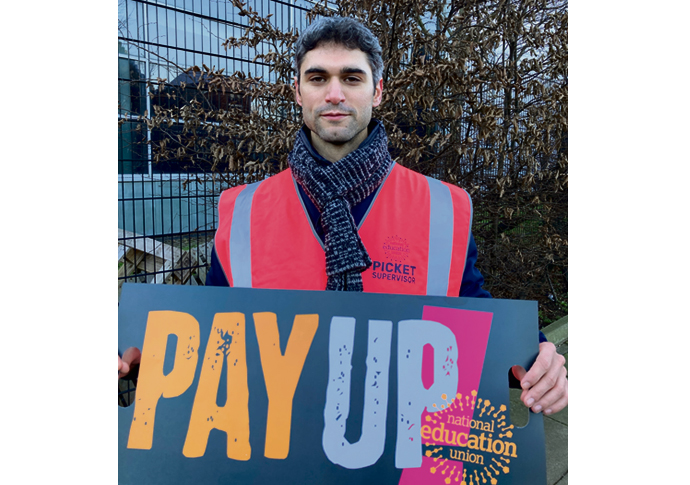
David Diaz, a teacher at the Bridge Secondary School
DAVID Diaz, 33, a sixth form teacher at the Bridge Secondary School for children with special needs, in Carleton Road, has been there for four years. He lives in Holloway and is from Spain.
“I know lots of teachers who have left because London is so expensive. You cannot afford the rent. Like, if you’re thinking about maybe having children, it’s impossible. So you need to find a job that pays better,” he said.
Describing how teachers are being asked to work with children with special needs without support staff, he said: “Well, one thing that is very obvious, and you see it every day, is we get more students in each class with the same number of support staff, or less even.
“And then support staff that are permanent, that used to be covered when they’re ill, now they’re not covered. That’s probably the main thing that affects the day to day.”
Mr Diaz, who regularly works from 8.30am until 6.30pm with minimal breaks, said the workload was another major reason teachers leave the profession. The cost of living crisis meant that this year for the first time he would be financially better off moving back to Spain.
He said: “I’m still positive. I want to keep being a teacher. That’s why I’m going to strike today. Because what I feel is like, after a few years in this country and in this school, like there’s a great team of teachers, I feel kind of part of our community. I live in Holloway. I see parents of the students when I go to the supermarket and it gives me a sense of belonging. And I don’t want to lose all of that.”
‘I’m not going to be able to afford to raise children here’
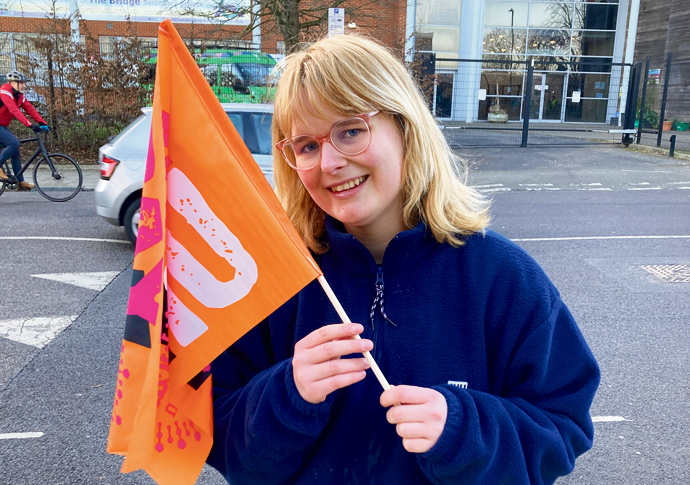
George Turner
GEORGE Turner, 23, an ECT whose mother taught for 35 years at Montem primary school and in Barnet, wanted to become a teacher since she was a child.
She said: “I’m scared that the job I’ve always wanted to do since I was eight, that I’m not going to be able to do it in years to come because of the conditions.
“I’m scared that, looking at the pay increases, if I want to live in London, and I want to raise children in London in the part of the city where I’m from – Archway – that it’s going to become untenable. And I’m just not going to be able to afford to raise a family on the pay that teachers are on.”
She added: “We need to think about the future. I know I’ve just started but I am the future of education.
“And if we’re not thinking about who’s coming next, and keeping them in and showing them that we should be here and really appreciating all the huge amount of skills you need to work with young children, then we are not going to have people entering and we’re going to have more and more people leaving.
“What does that show about how we care about the future of our country, the future of our children, and most importantly, the future of the most disadvantaged children and the children that don’t have outside opportunities? That’s where the money needs to be. The lack of resources, the daily fights of glue sticks, the fights over stationery – it’s the really simple things that just cause issues, day to day.”